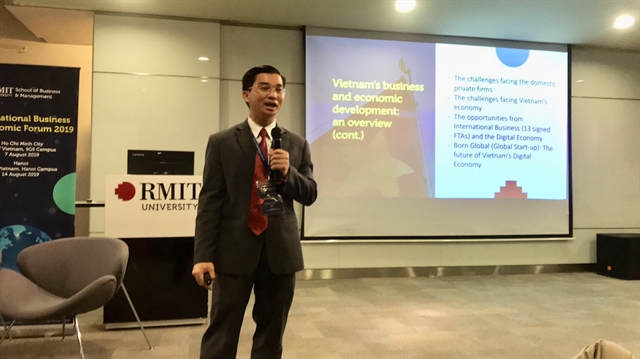Vietnamese start-ups that wish to go global must have a “global mindset” and “decision-making power” and be willing to “take risks” to capitalise on the opportunities for success in the digital economy, experts have said.

Vietnamese start-ups that wish to go global must have a “global mindset” and “decision-making power” and be willing to “take risks” to capitalise on the opportunities for success in the digital economy, experts have said.
Speaking at a recent forum in HCM City, Nguyen Quang Trung, senior lecturer and discipline lead for the International Business Programme at RMIT University Viet Nam, said first and foremost global start-ups must be passionate about their adventure as “passion gives you vision and energy.”
“They must also have a strong international outlook and international entrepreneurial orientation, and proactively compete in the international market,” he told Viet Nam News.
In addition, they must be willing to take risks, he noted. “Risk gives you quicker education.”
There are four “C risks” in international business, according to the lecturer.
He listed them as commercial risk (weak partner, operational problem, poor execution of strategy), cross-cultural risk (cultural differences, negotiation patterns, decision-making styles, ethical practices), country risk (government intervention, protectionism and barriers to trade and investment, red tape, lack of legal safeguards for intellectual property rights, social and political unrest), and currency risk (currency exposure, asset valuation, foreign taxation, inflation and transfer pricing).
“The specific advantages of taking risks include learning faster than people who do not take risks, having a broader range of experience and being able to overcome or get around obstacles faster.”
Other things needed for global start-ups to be successful include strong people skills such as understanding and treating people well to help build the business and business reputation, according to Trung.
For start-ups that want to go global, the key is to leverage advanced information and communications technology.
“ICT allows you to process information efficiently as well as communicate with partners and customers worldwide at a much lower cost.”
A global start-up is a venture launched to exploit a global niche from the first day of operations.
Start-up eco-system
Also speaking at the event, Dr Nguyen Quan, chairman of the Viet Nam Automation Association (VAA) and a former minister of science and technology, said Viet Nam was emerging as a new start-up hub in the region.
Meanwhile, the Government targeted developing the country into a technology powerhouse, he said.
"One factor driving Viet Nam’s dynamic innovation eco-system is the country’s young and well-educated population, which is a low-cost yet tech-savvy talent," he said.
Global start-ups, especially those that lack experience, would face a lot of challenges, he said, explaining one of them is the conflict between mindsets due to cultural differences between Vietnamese and people in other countries.
To help start-ups go global, the Government has collaborated with global venture funds as part of a national programme to support an innovative start-up eco-system through 2025.
For example, the Korean Venture Investment Corp, in partnership with the Vietnamese Ministry of Science and Technology, has set up a joint venture fund to help Vietnamese start-ups explore the Korean market.
Besides ventures funds, Vietnamese start-ups can also receive support from incubators, mentors and accelerator programmes.
Under the national digital transformation plan, Viet Nam aims to emerge as one of the top four countries in ASEAN in terms of digitisation by 2025 with 80,000 digital technology companies.
Viet Nam is currently among the most dynamic start-up hubs in the world and its well-educated, young entrepreneurs are expected to improve the country’s position on the global start-up map.
There are no official statistics on start-ups in the country, but according to some regional tech sources, there are as many as 3,000 in the country, which makes it the third largest start-up eco-system in Southeast Asia.
The country jumped 12 places to 47th out of 127 economies on the World Intellectual Property Organisation’s 2017 Global Innovation Index, its highest ranking in the last 10 years.
In Southeast Asia, it is only behind two countries, Singapore and Malaysia.
Viet Nam has become one of the fastest growing economies in the world and has begun to change its role in the international economic order, experts said.
A large number of Vietnamese firms are joining the disruptive, innovative global digital economy, which is already estimated to be worth $11.5 trillion world-wide.
These firms can immediately start dealing with international customers and suppliers and, so, are born global.
Titled ‘Born Global: The Future of Viet Nam’s Digital Economy’, the forum was organised by RMIT University Viet Nam.
Nearly 100 business executives, policymakers and academics from around the country took part. — VNS





